
The announced implosion at the Alpine F1 team last Friday at Spa and the wipeout of its senior management at a single stroke was undoubtedly a shock in terms of its timing and precise nature.
But for anyone who has been paying attention it was by no means an actual surprise. The latest developments had the painful inevitability of a slow-motion train wreck whose roots go back not merely weeks or months but several years.
The manifest problems on display seem so deeply ingrained as to look almost terminal without drastic changes at Enstone and Viry-Châtillon, extending far beyond just blaming whoever the current team principal or sporting director are at any given time.
Where did it all go wrong?
The advice to writers tackling stories like this is to start at the beginning: easier said than done in the case of Alpine's agonies. Renault was once a major part of Formula 1, winning five drivers' titles and six constructors' titles between 1992 and 1997 as an engine supplier to Williams and Benetton.
After acquiring Benetton as a works team it won in its own right in 2005 and 2006 with Fernando Alonso. But then came Crashgate in 2008, and by 2011 Renault had sold its interest in the team to Lotus while continuing to provide engines to the dominant Red Bull team.
By 2015 Lotus had gone into a steep decline and was on the brink of collapse and insolvency, resulting in an ageing infrastructure and an exodus of key talent. Renault left it until the last possible minute and then reluctantly stepped in to grudgingly buy what remained and bring it back under the Renault banner.

Frédéric Vasseur was recruited from ART, but his approach was at odds with Renault's objectives as a global conglomerate and he was gone in less than a year, with Cyril Abiteboul taking over as managing director in 2017.
By this point even Renault's power units were proving a problem. A lack of reliability and performance caused a terminal rift in their hitherto successful partnership with Red Bull.
Rumours circulated that Renault was about to sell the team and pull out of F1 altogether, but at the last minute there was a change of heart and they remained - at a cost. Now the team would need to visibly pull its weight in terms of its corporate objectives, but especially on the racetrack.






